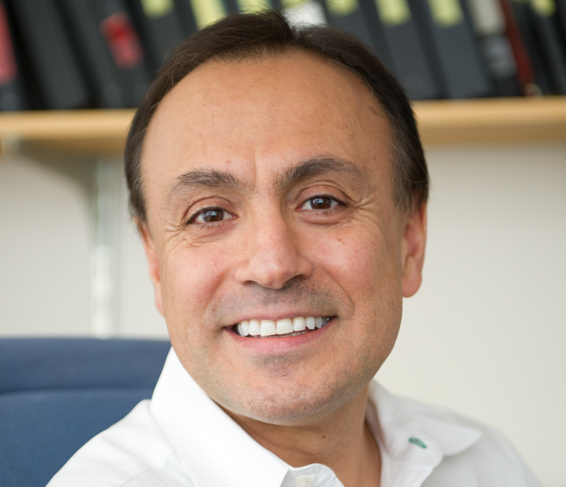-
Cyclin A2 maintains colon homeostasis and is a prognostic factor in colorectal cancer. J Clin Invest. 2021 02 15; 131(4). View in:
Pubmed
-
Stress-Induced Cyclin C Translocation Regulates Cardiac Mitochondrial Dynamics. J Am Heart Assoc. 2020 04 07; 9(7):e014366. View in:
Pubmed
-
A mitotic CDK5-PP4 phospho-signaling cascade primes 53BP1 for DNA repair in G1. Nat Commun. 2019 09 18; 10(1):4252. View in:
Pubmed
-
A Sequentially Priming Phosphorylation Cascade Activates the Gliomagenic Transcription Factor Olig2. Cell Rep. 2017 03 28; 18(13):3167-3177. View in:
Pubmed
-
Mammalian E-type cyclins control chromosome pairing, telomere stability and CDK2 localization in male meiosis. PLoS Genet. 2014 Feb; 10(2):e1004165. View in:
Pubmed
-
Cyclin D2-cyclin-dependent kinase 4/6 is required for efficient proliferation and tumorigenesis following Apc loss. Cancer Res. 2010 Oct 15; 70(20):8149-58. View in:
Pubmed
-
Peroxisome proliferator-activated receptor-delta induces cell proliferation by a cyclin E1-dependent mechanism and is up-regulated in thyroid tumors. Cancer Res. 2008 Aug 15; 68(16):6578-86. View in:
Pubmed
-
Roles of cyclins A and E in induction of centrosome amplification in p53-compromised cells. Oncogene. 2008 Sep 11; 27(40):5288-302. View in:
Pubmed
-
Duality of p27Kip1 function in tumorigenesis. Genes Dev. 2007 Jul 15; 21(14):1703-6. View in:
Pubmed
-
Cyclins and cdks in development and cancer: a perspective. Oncogene. 2005 Apr 18; 24(17):2909-15. View in:
Pubmed
-
Cell cycle in mouse development. Oncogene. 2005 Apr 18; 24(17):2877-98. View in:
Pubmed
-
Genetic replacement of cyclin D1 function in mouse development by cyclin D2. Mol Cell Biol. 2005 Feb; 25(3):1081-8. View in:
Pubmed
-
Expression of cyclins E1 and E2 during mouse development and in neoplasia. Proc Natl Acad Sci U S A. 2001 Nov 06; 98(23):13138-43. View in:
Pubmed
-
Specific protection against breast cancers by cyclin D1 ablation. Nature. 2001 Jun 28; 411(6841):1017-21. View in:
Pubmed
-
Deletion of the p27Kip1 gene restores normal development in cyclin D1-deficient mice. Proc Natl Acad Sci U S A. 2001 Jan 02; 98(1):194-9. View in:
Pubmed
-
Cyclin D2 is essential for BCR-mediated proliferation and CD5 B cell development. Int Immunol. 2000 May; 12(5):631-8. View in:
Pubmed
-
A developmentally regulated switch directs regenerative growth of Schwann cells through cyclin D1. Neuron. 2000 May; 26(2):405-16. View in:
Pubmed
-
Cyclin D3 compensates for loss of cyclin D2 in mouse B-lymphocytes activated via the antigen receptor and CD40. J Biol Chem. 2000 Feb 04; 275(5):3479-84. View in:
Pubmed
-
Direct induction of cyclin D2 by Myc contributes to cell cycle progression and sequestration of p27. EMBO J. 1999 Oct 01; 18(19):5321-33. View in:
Pubmed
-
Rescue of cyclin D1 deficiency by knockin cyclin E. Cell. 1999 Jun 11; 97(6):767-77. View in:
Pubmed
-
Cerebellar histogenesis is disturbed in mice lacking cyclin D2. Development. 1999 May; 126(9):1927-35. View in:
Pubmed
-
Reduced skin tumor development in cyclin D1-deficient mice highlights the oncogenic ras pathway in vivo. Genes Dev. 1998 Aug 15; 12(16):2469-74. View in:
Pubmed
-
A specific role for cyclin D1 in mammary gland development. J Mammary Gland Biol Neoplasia. 1997 Oct; 2(4):335-42. View in:
Pubmed
-
Cyclin D2 is an FSH-responsive gene involved in gonadal cell proliferation and oncogenesis. Nature. 1996 Dec 05; 384(6608):470-4. View in:
Pubmed
-
Cyclin D1 provides a link between development and oncogenesis in the retina and breast. Cell. 1995 Aug 25; 82(4):621-30. View in:
Pubmed
-
Developmental and tissue-specific regulation of mouse dystrophin: the embryonic isoform in muscular dystrophy. Neuromuscul Disord. 1991; 1(2):125-33. View in:
Pubmed
-
The molecular basis of muscular dystrophy in the mdx mouse: a point mutation. Science. 1989 Jun 30; 244(4912):1578-80. View in:
Pubmed




.jpg?itok=WVqUqoeP)